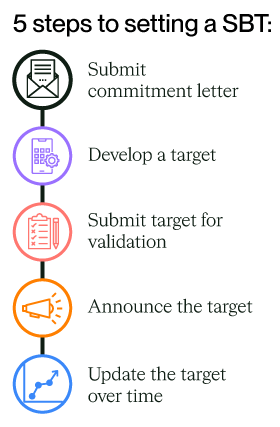
What are Science-Based Targets?
Science-based targets (SBTs) are greenhouse gas reduction goals set by businesses. They are defined as “science-based” when they align with the scale of reductions required to keep global temperature increases well-below 2°C compared to pre-industrial temperatures. SBTs provide businesses with pathways to sustainable transformational change to accelerate the transition to a low-carbon economy.
The business case for companies to set targets is clear. The Science-based Target Initiative (SBTi) outlined four incentives for companies to set SBTs:
- Drive innovation
- Reduce regulatory uncertainty
- Strengthen investor confidence and credibility
- Improve profitability and competitiveness
How to set Science Based Targets
Setting a SBT involves developing emissions-reduction targets consistent with the world’s carbon mitigation requirements to keep the globe below 2°C warming and align with Paris Agreement emission reductions forecasts. The process begins by submitting a commitment letter that, once received, recognises the company as ‘committed’ to aligning emissions reduction targets to 1.5°C. The company is then added to the SBT website and partner CDP and We Mean Business sites. Companies then have 24 months to complete the remaining steps.
Then, companies must develop targets in line with the science based target criteria. Following the successful development of SBTs, companies must submit these, where they will be reviewed and validated against the SBT criteria.

Once approved, the SBT will announce the company as part of those ‘companies taking action’. The company must then make public its commitment within 6 months by announcing its targets and informing stakeholders.
Setting SBTs involves tracking and reporting on this target over time, including disclosures through CDP, annual reports, sustainability reports and the company website.
Podcast | Science-based Targets

Listen in as Anthesis’ Chris Peterson discusses climate change, Science-Based Targets and businesses committing to the 1.5 degree target.
Understanding your emissions
Setting SBTs begins with the identification of company emissions, considering the three scopes of emissions defined by the GHG Protocol Corporate Standard: Scope 1, 2 and 3.
Scope 1 and 2 emissions are ‘owned’ by your company. Scope 1 emissions constitute direct emissions from within the organisation, such as natural gas and fleet vehicle usage. Scope 2 emissions relate to indirect emissions from the production of energy eventually used by the organisation, such as electricity purchased. As scope 1 and 2 emissions can be directly controlled, setting appropriate targets and committing to them is relatively straightforward.
What about Scope 3 Targets?
Scope 3 emissions refer to a company’s emissions within their supply chain. Of companies who have set science-based targets, over 90% of them address scope 3 reductions. These scope 3 reductions can be met via absolute reductions or from a large portion of the company’s suppliers setting their own targets. The real work of meeting these targets is around shortening the cycle of supplier capacity-building, moving suppliers quickly from understanding to action on climate.
Examples of setting a SBT
Get in touch for support on setting or revalidating your Science Based Target. An Anthesis SBT expert will be in touch.













